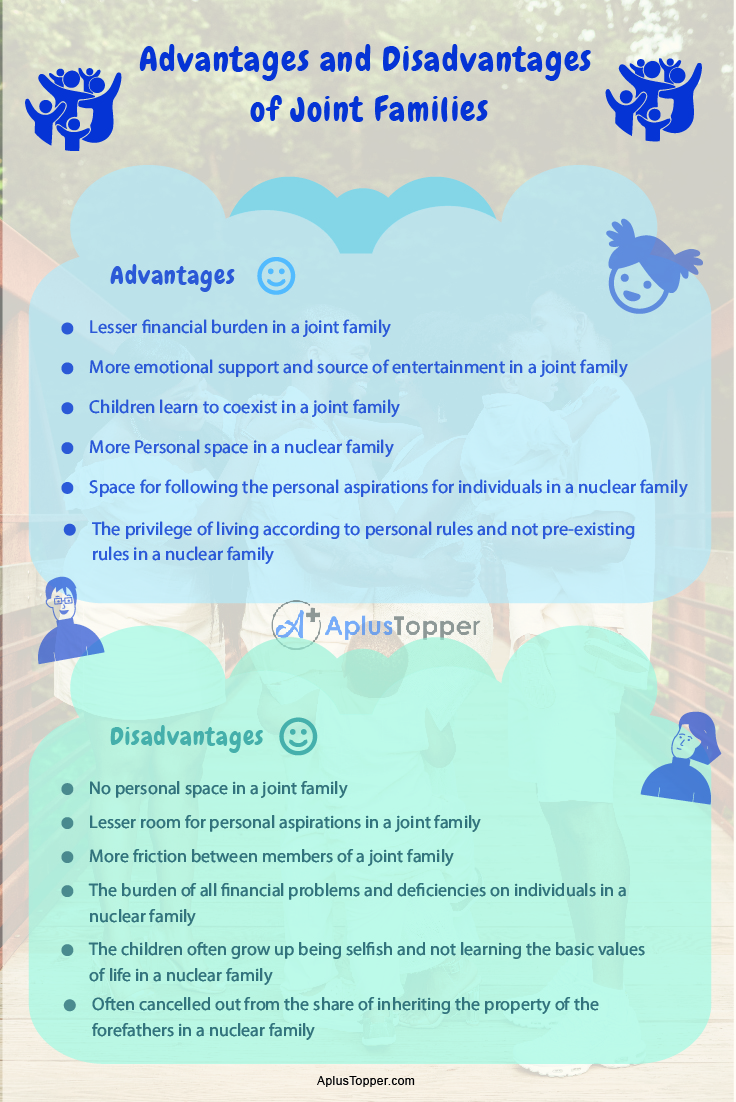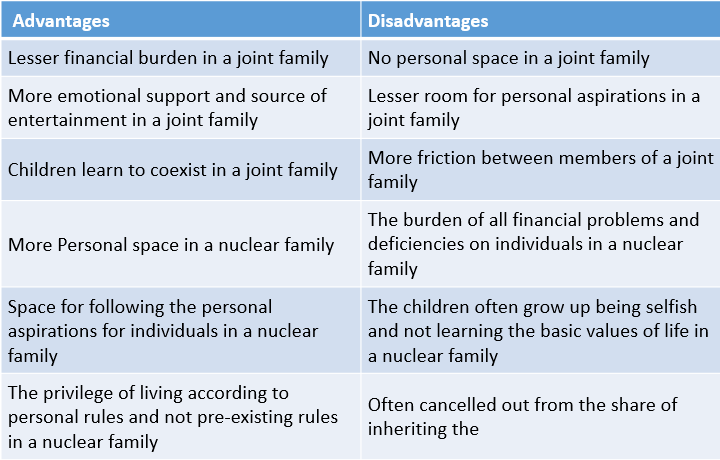Advantages and Disadvantages of Joint Family and Nuclear Family: Humankind constitutes of people, and most of these people exist in groups during their tenure on Earth. These groups are called families. There are different kinds of families that exist, from joint family to nuclear family, immediate families, extended families, etcetera. Extended families are the kinds that include persons who are not related by blood and have compacted into families by their association and emotional bonds. On the other hand, the immediate families are the ones that are composed of people who are related by blood. The immediate families can be further classified into Joint families and Nuclear families.
Students can also find more Advantages and Disadvantages articles on events, persons, sports, technology, and many more.
What are Joint Families and Nuclear Families? Advantages and Disadvantages of Joint Families and Nuclear Families 2022
Joint families are a form of immediate families that has several subfamilies existing together in one household or house plot. Elaborating, A mother family with a father, a mother and their kids residing in one household passes over the household and the associates of the same to the kids, who continue coexisting together with their kids, and then the next generations continue to do the same. This is how a joint family is formed.
Nuclear families are those forms of immediate families that exist separately from the bigger families and are often have lesser members. The driving forces behind nuclear families can be varied – it can be because of friction from the bigger families or can be voluntary. Nuclear families are the new emerging types of families that have surpassed the number of joint families in every part of the world. Especially, the newer generations have been the propagator of making their own families and living independently.
The topics that will be discussed Joint Families are,
- Advantages of Joint families
- Disadvantages of joint families
- Comparison table delineating the advantages and disadvantages of joint families
- FAQs about Joint families
Advantages of a Joint Family and Nuclear Family
- Children learn to live together in a joint family: The children of the household often grow up learning how to coexist with other people; they learn values like sharing, caring and adjustment, etcetera.
- Emotional and financial supports in a joint family: With so many people coexisting in a joint family, often an individual can get their source of emotional support from many people. The financial burden upon an individual is also reduced when they live in a joint family.
- More source of entertainment in a joint family: Loneliness is out of the question when one lives in a joint family because with so many people around, there is always a constant source of entertainment.
- More Personal Space in a nuclear family: Nuclear families award a lot of personal space to individuals that are impossible in joint families. Personal space is a major requirement in the lives of people.
- Space for personal aspirations in a nuclear family: Nuclear families, allow an individual to peruse their personal aspirations and not remain limited to the expectations and rules of a lineage.
- No pre-existing rules to follow in nuclear family: Nuclear families have the privilege to function on their own formulated rules that do not comply with the preexisting rules of a bigger family.
Disadvantages of a Joint family and Nuclear Family
- No personal space in a joint family: Joint family has a lot of people living together; thereby, the personal spaces of individuals are often violated here, which can be a major problem for individuals.
- More Family friction in a joint family: Joint families triggers more frictions between the members than the other kind of families, as friction is inevitable when so many people live together.
- Thwarting personal aspiration in a joint family: Joint families often expect the thriving generations to follow in the same lineage as their forefathers; however, some of the new generations might possess different aspirations and goals in life – these are often thwarted, discouraged, and de-motivated.
- More financial liabilities in a nuclear family: The members of the nuclear families do not get the liberty to share their financial troubles with the other members, like in joint families. They are the ones who are entirely responsible for their financial liabilities.
- Children often grow up to be Selfish in a nuclear family: The children living in nuclear families grow up being concerned about them solely and grow up to become selfish, who do not learn to care for others and think about others.
- Might not inherit the property of ancestors in a nuclear family: The members of a joint family are more likely to inherit the properties of their forefathers than the members of a nuclear family. Thereby, the latter has to make their own property.

Comparison Table Delineating Advantages and Disadvantages of Joint Families
| Advantages | Disadvantages |
| Lesser financial burden in a joint family | No personal space in a joint family |
| More emotional support and source of entertainment in a joint family | Lesser room for personal aspirations in a joint family |
| Children learn to coexist in a joint family | More friction between members of a joint family |
| More Personal space in a nuclear family | The burden of all financial problems and deficiencies on individuals in a nuclear family |
| Space for following the personal aspirations for individuals in a nuclear family | The children often grow up being selfish and not learning the basic values of life in a nuclear family |
| The privilege of living according to personal rules and not pre-existing rules in a nuclear family | Often cancelled out from the share of inheriting the property of the forefathers in a nuclear family |

FAQ’s About Nuclear Families
Question 1.
Do joint families often disrupt mental peace?
Answer:
Yes, joint families often cause the disturbance of mental peace, as the family frictions can become ugly at times.
Question 2.
Do Joint families exist even in today’s world?
Answer:
Although lesser in number, joint families still continue to exist in today’s world.
Question 3.
Are joint families responsible for the good growth of a child?
Answer:
It has dual answers. The joint families can induce good values to their children; it can also be the reason for the hindrance in their aspirations.
Question 4.
Can living in a nuclear family cause financial stress?
Answer:
All the financial liabilities of the members of a nuclear family lie on themselves; thereby, it can often be stressful for them to bear the whole burden.
Question 5.
Is it better for new couples to live in a nuclear family?
Answer:
Nuclear families allow personal space; thereby, it is ideal for a new couple to live in a nuclear family and grow their bond stronger.
Question 6.
Are nuclear families bad for children?
Answer:
No, it just mostly makes most of them rather self-centered.
